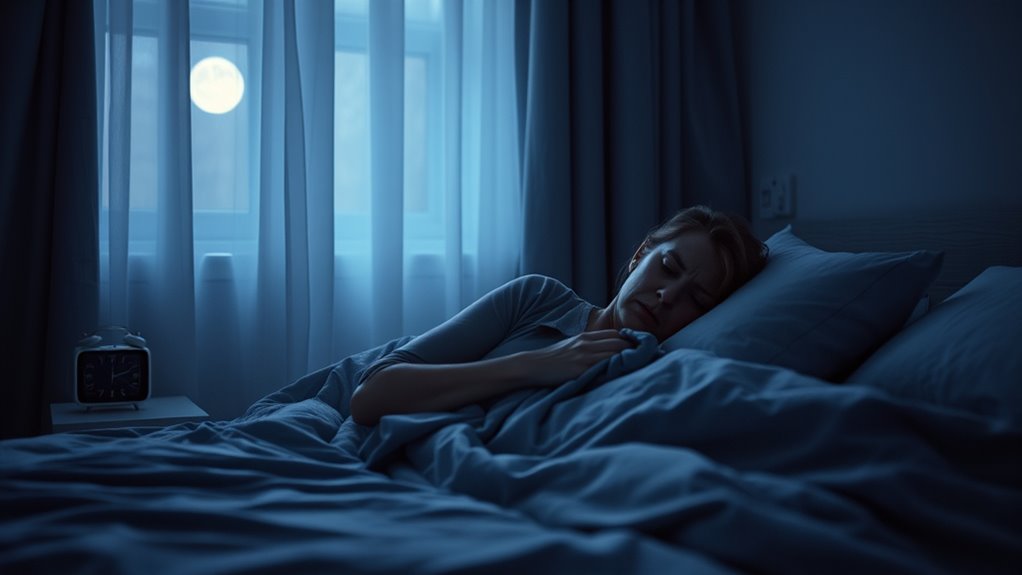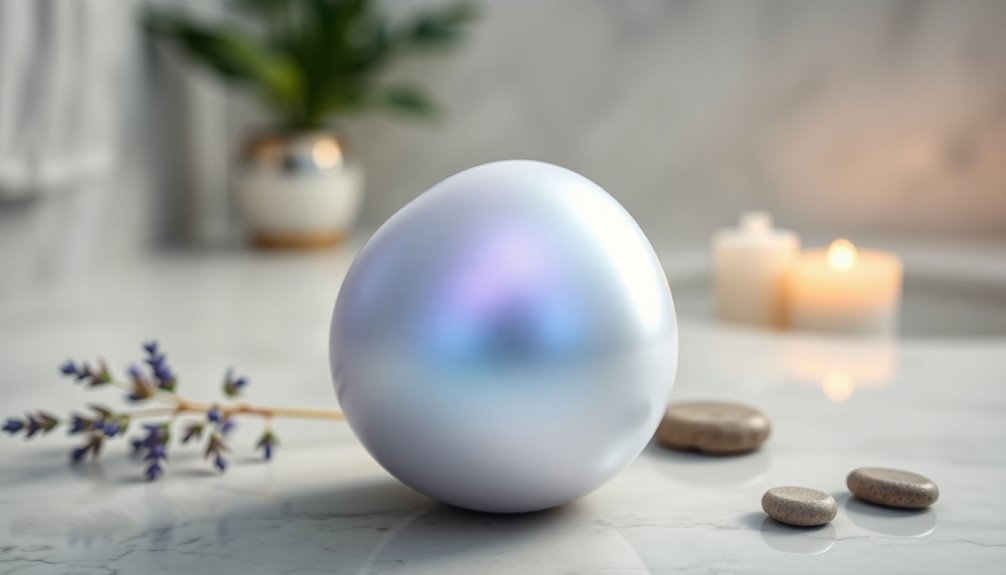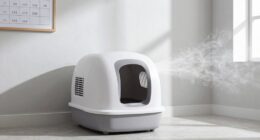Sleep disruptions during menopause are common due to hormonal changes that affect your sleep cycle. You might experience trouble falling asleep, night awakenings, hot flashes, night sweats, and restlessness. Lifestyle factors like caffeine, stress, and an uncomfortable sleep environment can also worsen these problems. Managing symptoms with a cool room, soothing routines, and relaxation techniques can help. To find out more about effective strategies, explore ways to improve your sleep during menopause.
Key Takeaways
- Hormonal fluctuations during menopause, especially declines in estrogen and progesterone, disrupt sleep-wake cycles and cause symptoms like night awakenings and vivid dreams.
- Hot flashes and night sweats directly interfere with sleep, causing fragmentation, discomfort, and increased anxiety.
- Lifestyle factors such as caffeine, alcohol, stress, and irregular routines can worsen sleep disruptions during menopause.
- Creating a cool, dark, and quiet sleep environment along with consistent routines and relaxation techniques can improve sleep quality.
- Persistent sleep issues should prompt consultation with healthcare providers for targeted treatments, including hormone therapy or other interventions.
Understanding the Connection Between Menopause and Sleep Changes

Menopause often brings about significant changes in sleep patterns, and understanding why this happens can help you manage the symptoms more effectively. During menopause, your body’s hormone levels, especially estrogen and progesterone, fluctuate drastically. These hormones influence your sleep-wake cycle, and their decline can lead to difficulties falling asleep or staying asleep. Additionally, decreased estrogen levels can affect the body’s temperature regulation, causing hot flashes and night sweats that disrupt your rest. These hormonal shifts also impact neurotransmitters involved in sleep, further disturbing your circadian rhythm. Recognizing that hormonal changes are a natural part of menopause helps you understand why sleep disruptions occur, empowering you to seek targeted strategies and treatments to improve your sleep quality during this changeover. Understanding the science behind hormone fluctuations can help you better adapt to these changes and find effective relief.
Common Sleep-Related Symptoms During Menopause
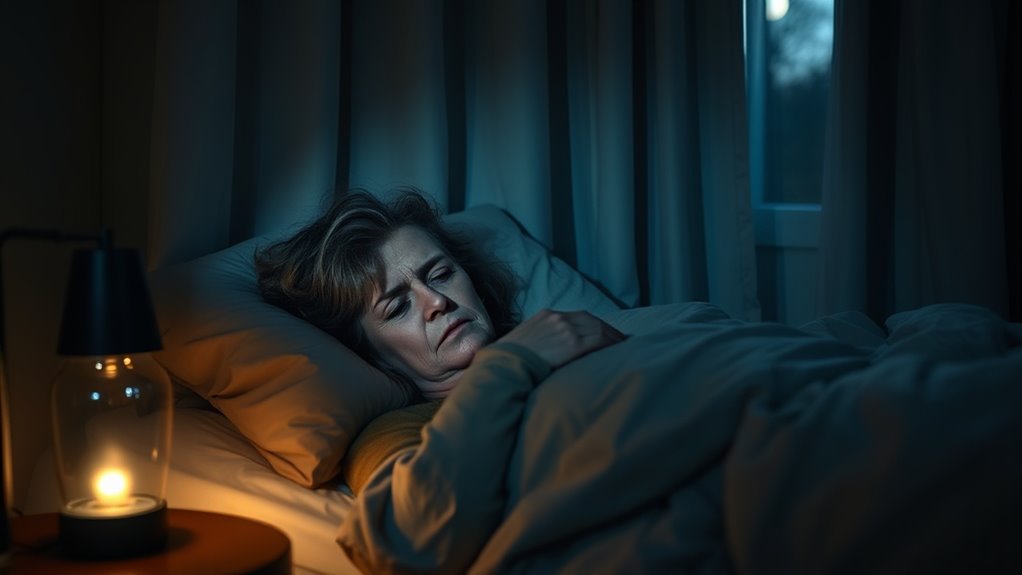
Many women experience a range of sleep-related symptoms during menopause that can considerably affect daily life. Common issues include trouble falling asleep, frequent night awakenings, and early morning awakenings. You might also notice increased restlessness or vivid dreams that disrupt your sleep cycle. These symptoms can lead to daytime fatigue, mood swings, and reduced concentration. To better understand these symptoms, consider this table:
| Symptom | Impact |
|---|---|
| Difficulty falling asleep | Longer time to feel rested |
| Night awakenings | Fragmented sleep and fatigue |
| Early morning awakening | Reduced total sleep time |
| Restlessness | Tossing and turning all night |
| Vivid dreams | Disrupted sleep and fatigue |
Recognizing these symptoms helps you address them early and seek appropriate support.
Hormonal Fluctuations and Their Impact on Rest

Hormonal fluctuations during menopause markedly influence sleep patterns by disrupting the delicate balance of sleep-regulating hormones. As your estrogen and progesterone levels decline, your sleep cycle faces challenges. Lower estrogen reduces the production of serotonin, which is essential for sleep regulation, leading to difficulties falling asleep and staying asleep. Progesterone, known for its calming effects, decreases as well, making it harder to relax at night. These hormonal shifts can cause increased wakefulness and lighter sleep stages. You might notice more fragmented sleep or trouble reaching restorative sleep phases. Understanding this connection helps explain why your sleep quality may decline during menopause. Managing hormonal fluctuations through lifestyle or medical interventions can considerably improve your sleep and overall well-being. Incorporating beetroot recipes rich in nutrients may also support hormonal health and sleep quality.
The Role of Hot Flashes and Night Sweats in Sleep Disruption
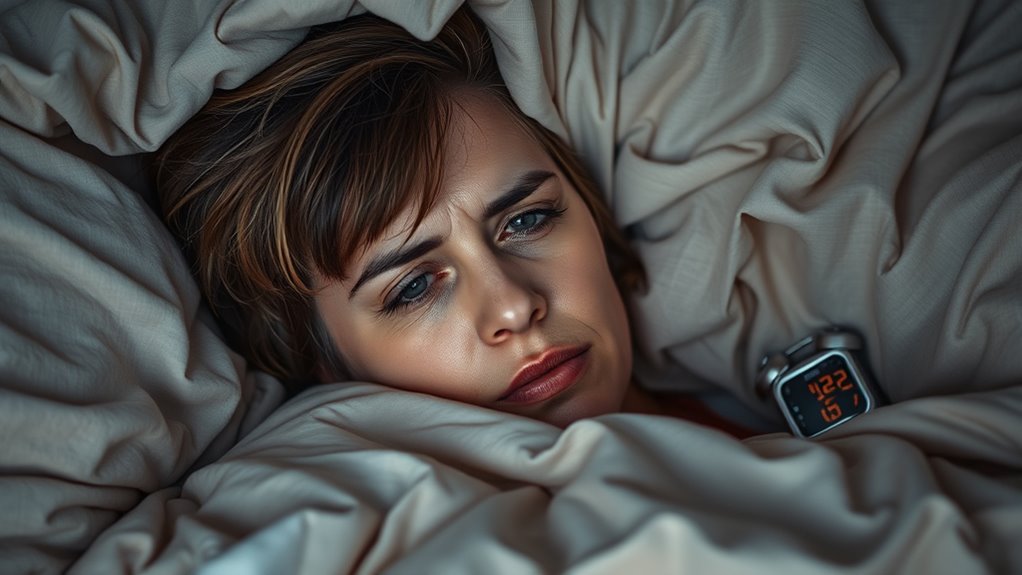
Hot flashes and night sweats can wake you up repeatedly, making restful sleep hard to find. These symptoms disrupt your sleep cycle and leave you feeling exhausted during the day. Learning ways to manage these disruptions can help improve your overall sleep quality. Understanding the physiological processes behind hot flashes can also aid in developing effective coping strategies.
Hot Flashes and Sleep
Night sweats and hot flashes often strike unexpectedly, disrupting your sleep cycle and making it difficult to rest peacefully. When a hot flash hits, you might suddenly feel intense heat spreading through your body, causing you to toss and turn. This abrupt surge can wake you, leaving you frustrated and wide awake, even if you were close to falling asleep. The discomfort may cause you to sweat excessively, which can soak your sheets and increase your discomfort. These episodes interrupt your sleep continuity, leading to fragmented rest and a feeling of exhaustion the next day. Hot flashes are more than just a nuisance—they directly interfere with your ability to achieve deep, restorative sleep, making it harder to wake up feeling refreshed.
Night Sweats Effects
When hot flashes occur, they often bring on night sweats that can intensify sleep disruptions. Night sweats cause you to wake up suddenly, drenched in sweat, making it hard to fall back asleep. This cycle can repeat multiple times throughout the night, leaving you feeling exhausted in the morning. The discomfort from night sweats can also increase your anxiety about sleeping, creating a negative feedback loop. Because your body struggles to regulate temperature during these episodes, restful sleep becomes elusive. Over time, frequent night sweats can lead to sleep deprivation, affecting your mood, concentration, and overall well-being. Recognizing their impact is essential, as addressing night sweats can markedly improve your sleep quality during menopause. Incorporating sleep hygiene practices can help minimize the effects of night sweats and promote better rest.
Managing Disruptions
Managing disruptions caused by hot flashes and night sweats requires a proactive approach to minimize their impact on your sleep. Start by keeping your bedroom cool—set the thermostat lower and use a fan or air conditioner to create a comfortable environment. Wear breathable, moisture-wicking sleepwear and keep a fan nearby to help cool your skin quickly. Establish a calming bedtime routine to reduce stress, which can trigger hot flashes. Avoid caffeine, alcohol, and spicy foods in the evening, as they can worsen symptoms. Practice relaxation techniques like deep breathing or meditation to help manage sudden flashes. If these strategies aren’t enough, consult your healthcare provider about medications or other treatments that can help control hot flashes and improve your sleep quality.
Lifestyle Factors That Affect Sleep During Menopause
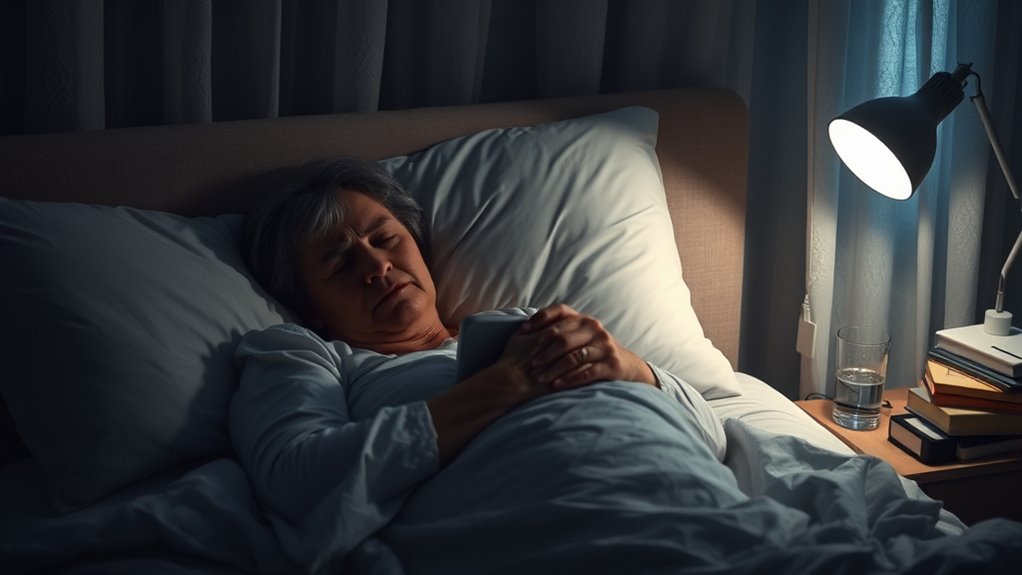
Lifestyle factors can substantially influence sleep quality during menopause. Your daily habits and environment play a crucial role in managing sleep disruptions. For example, caffeine and alcohol intake can interfere with your ability to fall asleep and stay asleep. Stress and lack of physical activity may also worsen sleep issues. Creating a calming bedtime routine and maintaining a consistent schedule help promote better rest. Being aware of dog names associated with calmness or energy can sometimes inspire healthier routines.
Strategies for Improving Sleep Quality in Menopausal Women

To improve your sleep during menopause, establishing a consistent sleep routine can make a big difference. Managing nighttime symptoms like hot flashes and discomfort is also key to getting restful sleep. Implementing these strategies can help you wake up feeling more refreshed and balanced. Additionally, creating a safe space for expressing feelings can reduce stress and promote relaxation before bedtime.
Establish Consistent Sleep Routine
Establishing a consistent sleep routine is essential for improving sleep quality during menopause. When you go to bed and wake up at the same time every day, your body develops a reliable internal clock, making it easier to fall asleep and wake refreshed. To create this routine:
- Set a fixed bedtime and morning wake time, even on weekends.
- Wind down with calming activities, like reading or gentle stretching, 30-60 minutes before bed.
- Avoid screens and caffeine close to bedtime, as they can interfere with sleep signals.
- Limit naps during the day to prevent disrupting your nighttime sleep cycle.
- Incorporate relaxation techniques, such as deep breathing or aromatherapy, to promote better sleep quality.
Stick to these habits consistently to enhance your sleep quality and reduce menopausal sleep disruptions.
Manage Nighttime Symptoms
Managing nighttime symptoms such as hot flashes, night sweats, and anxiety can considerably improve your sleep during menopause. To reduce hot flashes, try dressing in lightweight, breathable clothing and keeping your bedroom cool. Using a fan or air conditioner can help maintain a comfortable environment. For night sweats, avoid spicy foods and caffeine before bed, and stay hydrated. Managing anxiety is also essential; practice relaxation techniques like deep breathing, meditation, or gentle yoga before bedtime. Consider using a weighted blanket to promote calmness. If symptoms persist, consult your healthcare provider about medications or hormone therapy options. Implementing these strategies can help you stay cooler, calmer, and more restful throughout the night, leading to better sleep quality overall. Additionally, incorporating climate control solutions such as adjusting your home’s temperature with energy-efficient systems can create an environment that supports better sleep.
When to Seek Medical Advice for Sleep Issues

If sleep disruptions during menopause considerably affect your daily life, it’s important to seek medical advice promptly. Persistent sleep problems that last for weeks or worsen despite self-care measures should not be ignored. You should see a healthcare professional if:
- You experience ongoing insomnia or frequent awakenings.
- Sleep issues cause daytime fatigue, mood changes, or difficulty concentrating.
- You notice symptoms like loud snoring or gasping, which could indicate sleep apnea.
- Sleep problems are accompanied by other health concerns, such as depression or hot flashes that interfere with rest.
Additionally, understanding the impact of sleep disorders on overall health and the importance of high-quality sleep can guide timely intervention. Timely medical advice can help identify underlying causes and provide tailored treatment options to improve your sleep quality and overall well-being. Don’t wait if your sleep issues become unmanageable.
Frequently Asked Questions
Can Menopause-Related Sleep Issues Be Permanent?
You wonder if menopause-related sleep issues can be permanent. While some women experience short-term disruptions due to hormonal changes, many find their sleep improves over time or with treatment. Lifestyle adjustments, like regular exercise and stress management, help restore restful sleep. If problems persist, consult a healthcare provider to explore options like hormone therapy or other interventions. Remember, with proper care, sleep difficulties often decrease or resolve entirely.
Do Sleep Aids Work Effectively During Menopause?
Wondering whether sleep aids work during menopause? You’ll find that they can provide temporary relief, helping you fall asleep faster and stay asleep longer. However, their effectiveness varies from person to person, and they might come with side effects or reliance risks. It’s wise to combine sleep aids with lifestyle changes like relaxation techniques and healthy habits for holistic help. Always consult your healthcare provider before starting any new sleep solution.
How Does Diet Influence Menopausal Sleep Disruptions?
Diet plays a significant role in your sleep quality, especially during menopause. Eating foods rich in magnesium, like leafy greens and nuts, can promote relaxation and improve sleep. Limiting caffeine and sugar intake in the evening helps prevent disruptions. Incorporate lean proteins and complex carbs to stabilize blood sugar levels. Staying hydrated and avoiding heavy meals before bed also support better rest, making it easier for you to fall asleep and stay asleep.
Are There Specific Exercises That Improve Sleep During Menopause?
Imagine calming your mind and body before bed—that’s what regular exercise can do. You should try aerobic activities like walking, swimming, or cycling, which boost endorphins and reduce stress. Yoga and stretching also promote relaxation and ease muscle tension. Consistent exercise, especially earlier in the day, helps regulate your sleep cycles, making it easier to fall asleep and stay asleep during menopause.
Can Stress Management Reduce Menopause-Related Sleep Problems?
Managing stress can substantially improve your sleep during menopause. When you reduce stress, your body produces fewer stress hormones like cortisol, helping you relax more easily at night. Practices such as deep breathing, meditation, or gentle yoga can calm your mind and body, making it easier to fall asleep and stay asleep. By actively managing stress, you create a more peaceful bedtime environment, which can lessen menopause-related sleep issues.
Conclusion
Understanding how menopause affects your sleep can empower you to make positive changes. By recognizing common symptoms and adopting effective strategies, you can improve your rest and quality of life. Remember, you’re not alone in this journey—support and treatment options are available. Isn’t prioritizing your sleep essential for managing menopause with resilience? Take proactive steps today to reclaim restful nights and overall well-being.
